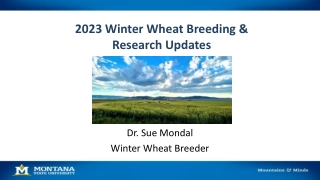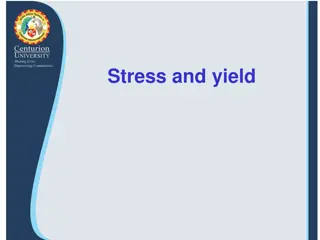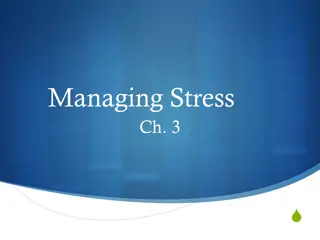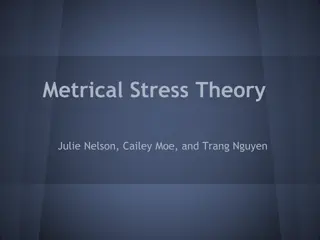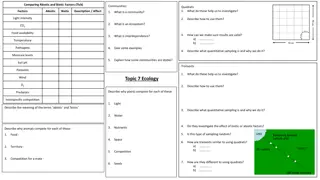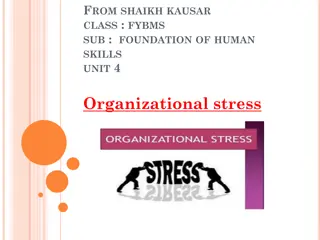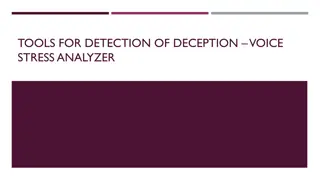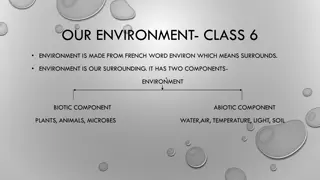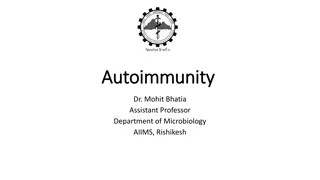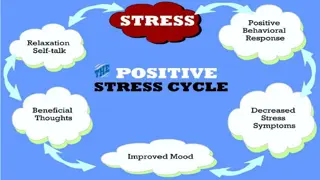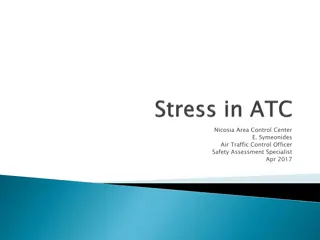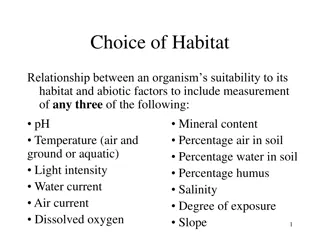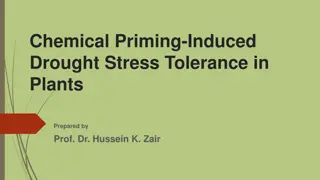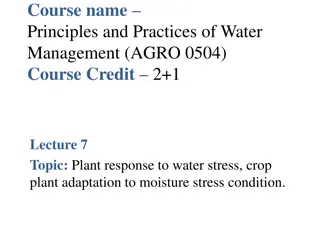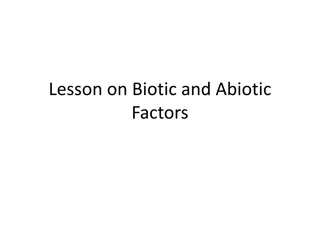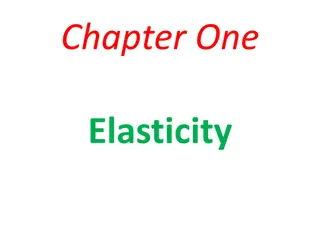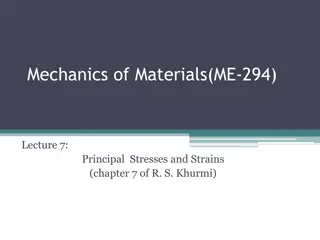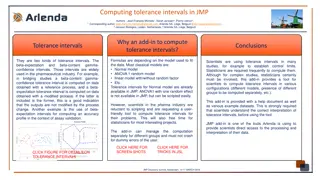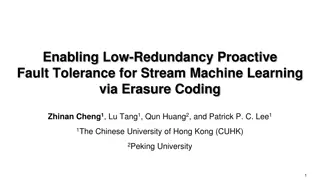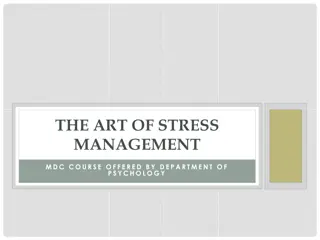2023 Winter Wheat Breeding & Research Updates
Get the latest updates on winter wheat breeding and research from Dr. Sue Mondal, a winter wheat breeder. Explore topics such as abiotic stress tolerance, genomic technologies, rapid cycling, disease resistance, and more.
3 views • 21 slides
Understanding Environmental Stress and Plant Management
Environmental stress, whether biotic or abiotic, can adversely affect plant growth and yield. Factors such as temperature extremes, waterlogging, radiation, chemicals, and pollution can lead to plant strains that may be reversible or permanent. Effective management of stress due to excessive moistur
9 views • 35 slides
Understanding Stress and Its Main Causes
Stress is a natural response to challenging events in life. Positive stress, known as eustress, promotes growth, while negative stress, distress, can be harmful. Major life changes, catastrophes, everyday problems, and environmental factors can all contribute to stress levels. Recognizing these caus
0 views • 20 slides
Exploring Metrical Phonology: A Brief Overview
Metrical phonology, a subtheory of generative phonology, focuses on categorizing stress and stress rules within rhythmic hierarchies. It differs from generative phonology by not treating stress as a segmental feature specific to vowels. Originating from Halle's linear analysis, metrical stress theor
0 views • 32 slides
Exploring TOLERANCE - Artwork by Guy Ferrer
Guy Ferrer, a contemporary French/Mediterranean artist, created the TOLERANCE series to address religious tensions and promote compassion, hope, and mutual respect. Through his sculptures, Ferrer advocates for universal tolerance, emphasizing the importance of accepting different beliefs to foster h
0 views • 16 slides
Exploring Abiotic and Biotic Factors in Communities
Investigating abiotic and biotic factors in communities through quadrats helps study interactions like light intensity, CO2 levels, food availability, and more. It ensures validity by considering interdependence, competition, and sampling techniques like transects. Examining adaptations in animals a
1 views • 4 slides
Understanding Stress: Types, Management, and Sources
Stress is a complex phenomenon affecting individuals differently. It is crucial to comprehend stress, its sources, and how to manage it effectively. Claude Bernard's concept of the internal environment sheds light on the negative aspects of stress. Stress can be categorized into eustress (good stres
0 views • 24 slides
Understanding Organizational Stress: Impact on Performance and Coping Strategies
Stress in organizations is a state of imbalance between demands and capabilities, affecting individuals' emotional, cognitive, and physiological responses. Stress can be constructive or destructive, impacting job performance. Stress vulnerability is influenced by perceived control and autonomy level
0 views • 24 slides
Understanding Voice Stress Analysis for Deception Detection
Voice Stress Analysis (VSA) employs technology to detect micro-tremors in the vocal muscles that indicate stress, potentially linked to deception. Developed based on Dr. Lippold's work, VSA systems measure changes in speech characteristics caused by mental stress, aiming to assess the truthfulness o
0 views • 11 slides
Understanding Our Environment: Class 6 Overview
The environment, derived from the French word "environ" meaning surrounds, encompasses both biotic (living) and abiotic (non-living) components. Biotic components include plants, animals, and microbes, while abiotic components consist of water, air, temperature, light, and soil. Plants are producers
1 views • 9 slides
Understanding Autoimmunity and Immunological Tolerance
Autoimmunity is a condition where the body's immune cells mistakenly attack its own tissues, leading to damage. Immunological tolerance helps prevent this by mechanisms like central and peripheral tolerance. Central tolerance involves deleting self-reactive immune cells during maturation in key orga
1 views • 32 slides
Understanding and Managing Stress for Optimal Health and Well-being
Stress is the body's response to various events and experiences, which can either help you rise to challenges or become overwhelming. It's vital to recognize and manage stress through establishing healthy lifestyle behaviors, recognizing symptoms of stress overload, and adopting stress management te
0 views • 9 slides
Understanding English Rhythm and Stress Patterns in Speech
Delve into the nuances of English rhythm and stress patterns in speech with a focus on word stress, phrase stress, and the principle of eurhythmy. Explore how stress is influenced by volume, pitch, and duration of syllables in monosyllabic, disyllabic, trisyllabic, and polysyllabic words, with empha
0 views • 25 slides
Understanding Ecosystems: Structure, Components, and Functions
Ecosystems are intricate units where living organisms interact with each other and the environment. They consist of biotic (living) and abiotic (non-living) components, interrelated in a chain of interactions. Biotic components include autotrophs, heterotrophs, and decomposers, while abiotic compone
0 views • 15 slides
Understanding Ecosystems: A Comprehensive Guide
An ecosystem comprises both living (biotic) and non-living (abiotic) factors interacting in a specific area, with populations, communities, and ecology playing essential roles. Abiotic factors like temperature, water, sunlight, and wind influence species distribution, while biomes categorize ecosyst
1 views • 23 slides
Understanding Stress Corrosion Cracking and Corrosion Fatigue in Materials Engineering
Stress Corrosion Cracking (SCC) is a type of corrosion where the metal gets cracked due to the presence of a corrosion medium and tensile stress conditions. Factors influencing SCC include environmental composition, stress, metal composition, and temperature. Prevention methods involve selecting sui
0 views • 12 slides
Understanding Different Types of Stress and Coping Strategies
Stress can have different origins - anticipatory stress, situational stress, and residual stress. Learn to recognize each type and explore effective coping mechanisms to manage stress in various situations, from everyday challenges to traumatic events like the pandemic.
0 views • 6 slides
Understanding Stress: Impact on Mental and Physical Health
Stress is a state of strain due to internal or external factors. It can manifest as acute or chronic, impacting physical, mental, and emotional health. Acute stress is short-term and manageable, while chronic stress is dangerous and hard to cope with. Eustress, a positive form of stress, can enhance
0 views • 24 slides
Understanding Stress and Anxiety in Youth
Stress and anxiety are common challenges faced by youth today. This presentation by Dr. David Jacobi delves into the causes of stress, its effects on the body, mood, and behavior, and common signs to watch out for. It covers topics like stressors, stress responses, and the impact of stress on youth
0 views • 60 slides
Understanding Organism Habitat Suitability Through Abiotic Factors
Explore the relationship between organisms and their habitats based on abiotic factors like pH, temperature, light intensity, and more. Learn how to measure and relate these factors to the organisms' choice of habitat, with practical investigation procedures and result analysis provided.
0 views • 59 slides
Understanding Chemical Priming for Drought Stress Tolerance in Plants
Major agricultural industries struggle with abiotic stresses like drought, which can lead to crop losses. Nutrient limitations and cellular damage further compound the challenges plants face under water-limited conditions. Despite efforts in plant breeding, improving germplasm for drought tolerance
0 views • 72 slides
Non-enzymatic Antioxidant Responses of Maize Varieties to Water Stress
Introduction of maize as a crucial crop facing challenges from both biotic and abiotic factors like drought, leading to oxidative stress. Non-enzymatic antioxidants play a key role in combating reactive oxygen species (ROS) caused by drought, with crop landraces showing potential in stress adaptatio
0 views • 19 slides
Plant Responses to Water Stress in Agricultural Management
Understanding how plants respond to water stress is crucial for effective agricultural management. Stress can affect plant growth and development, leading to various adaptations such as resistance, avoidance, and tolerance. This course explores the physiological mechanisms behind plant stress respon
0 views • 44 slides
Genome-Wide Association for Drought Tolerance in Potato Study
PhD student João Vitor Nomura is conducting a Genome-Wide Association study for drought tolerance in potatoes at the University of São Paulo and the University of Wisconsin-Madison. The research focuses on adapting potato varieties to extreme heat waves and improving food security. Different abiot
0 views • 19 slides
Summer School on Stress - Selye International Institute 2017
The Summer School on Stress organized by the Selye International Institute in 2017 in Komarno, Slovakia, offers a comprehensive program on biologic stress, its mechanisms, pharmacologic implications, and stress management strategies. Hosted by renowned experts, the course delves into stress-related
0 views • 5 slides
Exploring Biotic and Abiotic Factors in Ecosystems
This lesson delves into the importance of biotic and abiotic factors in ecological systems. Students will learn to differentiate between living (biotic) and non-living (abiotic) components affecting organisms such as mice and plants. Through engaging activities and challenges, participants will gras
0 views • 21 slides
Understanding Psychological First Aid and Stress Management for Teens
Learn the importance of Psychological First Aid (PFA) in managing stress, the effects of stress on the mind and body, and how stress triggers the brain's response mechanisms. Discover common physical reactions to stress and how to identify and cope with them effectively. Explore the psychological an
0 views • 30 slides
Understanding Stress: Causes, Effects, and Management
Stress is the body's response to demands, events, or stimuli that exceed individual adaptive resources. It can have negative effects on physical and emotional well-being, leading to symptoms like weight changes, heart palpitations, and mood swings. However, not all stress is harmful; positive stress
0 views • 30 slides
Understanding Elastic Properties of Materials
Stress and strain are key concepts in understanding the elasticity of materials. Stress is the force acting on an object per unit area, while strain measures the degree of deformation due to stress. Different types of stress include tension, compression, and shear stress. The relationship between st
0 views • 41 slides
Advancing Rice Breeding Partnerships in Myanmar: Current Progress and Future Prospects
The collaborative efforts between IRRI and Myanmar in rice breeding have been fruitful since 1965, with numerous rice varieties released in Myanmar having IRRI lineage. The focus is on developing appropriate rice varieties for different regions to ensure rice yield stability. Target traits for delta
1 views • 17 slides
Understanding Organizational Risk Appetite and Tolerance
Explore the development of market risk appetite goals and how to define and establish organizational risk tolerance. Learn about the Classic Simplified View of Risk Tolerance and different methods to determine risk appetite. Discover the importance of assessing market risk impact and aligning risk t
0 views • 8 slides
Stress Management and Relaxation Techniques for a Calmer Mind and Body
Discover effective ways to manage stress and promote relaxation in your daily life. Learn about the definition of stress, practical tips for stress management, the benefits of yoga in stress relief, and try a calming workout routine to ease tension and promote well-being. Explore the role of relaxat
0 views • 6 slides
Understanding Principal Stresses and Strains in Mechanics of Materials
Introduction to principal stresses and strains in Mechanics of Materials, covering transformations of stress and strain, combined stress analysis, and methods to determine stress states on arbitrary planes in loaded bodies. Details stress elements, stress analysis on inclined sections, and stress di
0 views • 24 slides
Fault-Tolerant MapReduce-MPI for HPC Clusters: Enhancing Fault Tolerance in High-Performance Computing
This research discusses the design and implementation of FT-MRMPI for HPC clusters, focusing on fault tolerance and reliability in MapReduce applications. It addresses challenges, presents the fault tolerance model, and highlights the differences in fault tolerance between MapReduce and MPI. The stu
1 views • 25 slides
Computing Tolerance Intervals in JMP: An Add-In for Efficient Data Analysis
Tolerance intervals play a crucial role in statistical analysis, especially in industries like pharmaceuticals. This article introduces an add-in in JMP for computing tolerance intervals, highlighting the significance of understanding and interpreting these intervals correctly. The tool aims to simp
0 views • 4 slides
Understanding the Effects of Air Gap Tolerance on Inductance Tolerance
This technical note delves into the impact of air gap tolerance on inductance tolerance in transformer manufacturing. It explains how controlling the core's air gap dimension is crucial for maintaining desired inductance levels within manufacturing constraints. The text discusses the small scale of
1 views • 10 slides
Low-Redundancy Proactive Fault Tolerance for Stream Machine Learning
This study focuses on enabling fault tolerance for stream machine learning through erasure coding. Fault tolerance is crucial in distributed environments due to worker failures, and existing approaches like reactive fault tolerance and proactive replication have drawbacks. The use of erasure coding
0 views • 20 slides
Understanding Stress and Effective Stress Management
Stress is a common part of life but managing it is crucial for overall well-being. This content delves into the concept of stress, its impact on health, common symptoms, and practical ways to manage it effectively. It emphasizes the importance of identifying stressors, adopting healthy coping mechan
0 views • 22 slides
Finite Element Modeling for Stress-Strain Analysis in 2D Structures
Explore the implementation of 2D stress-strain Finite Element Modeling using MATLAB. Understand the concepts of stress, strain, plane stress conditions, stress-strain relation, Turner Triangle in FEM, linear interpolation, stress and strain vectors, static equilibrium, and stiffness matrix. Learn ho
0 views • 18 slides
Comprehensive Stress Management Course by Department of Psychology
Explore the in-depth study of stress management in this course offered by the Department of Psychology. Covering stressors, symptoms, sources of stress, stress models, and practical stress management techniques, this course equips you with the knowledge and skills to effectively manage stress in var
0 views • 12 slides
